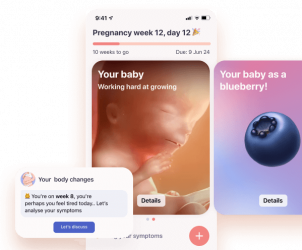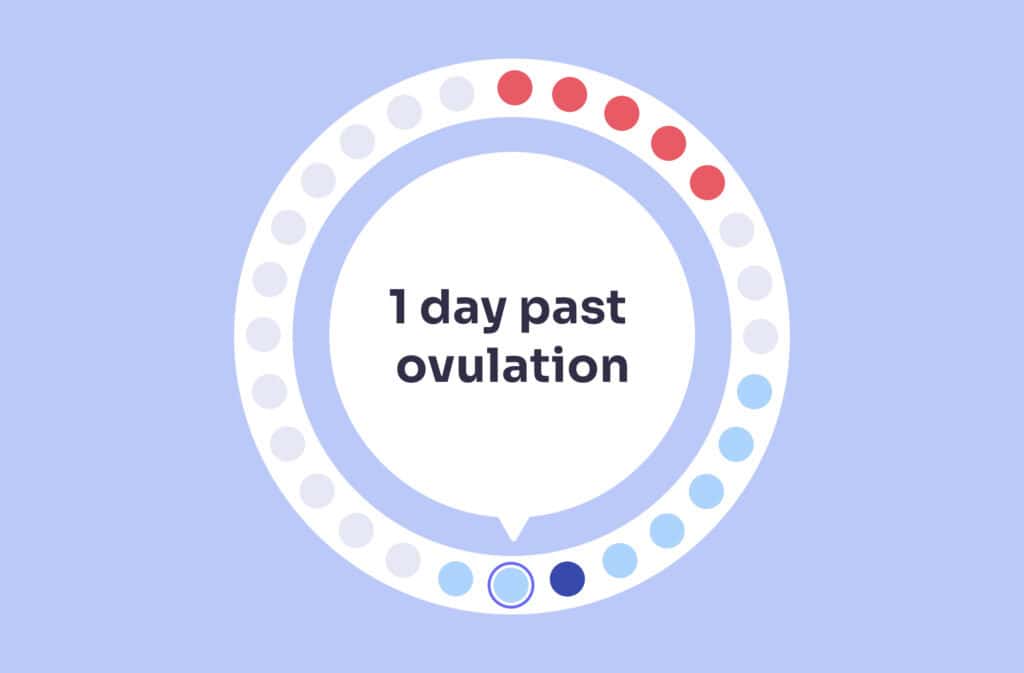Femia > Health Library > Pregnancy > Pregnancy health > When does first trimester fatigue peak, and how can you cope with it?
When does first trimester fatigue peak, and how can you cope with it?

- Updated Mar 2, 2025
- Published
CRAFTED BY HUMAN
Crafted by human At Femia, we provide accurate and up-to-date information at every stage of your journey, from trying to conceive, pregnancy and postnatal support. All content is created by a real person based on in-depth research and own professional experience. Femia ensures that you will receive expert advice, strict accuracy and a personalized approach from our authors/medical experts. Learn more about our editorial policy.
FACT CHECKED
Fact checked At Femia Health, we maintain the highest standards of editorial excellence in delivering content focused on helping you conceive, guiding you through pregnancy, and supporting you postpartum. Explore our content review principles to learn how we ensure the accuracy and quality of our health and lifestyle tips for every stage of your journey.
Exhaustion is a common symptom of pregnancy, especially during the first trimester. Pregnancy fatigue usually peaks towards the end of the first trimester and eases off for many during the second trimester. Hormonal changes, particularly the increase in progesterone, are one of the main causes of fatigue. To combat this, prioritize rest, maintain a healthy diet, stay hydrated, and engage in light exercise when you need an energy boost.
Extreme fatigue in the first trimester can be a particularly tough pregnancy symptom to battle, especially if those around you don’t know you are pregnant and are expecting you to keep up with your usual workload. Whether you’re struggling at work or exhausted from chasing your other kids around all day, first trimester fatigue can sometimes feel overwhelming.
Unfortunately, there isn’t a cure for this pesky pregnancy symptom. However, there are things you can do to manage pregnancy tiredness: Eating a healthy diet, resting whenever possible, and respecting your body’s new limits can help ease the impact of fatigue. When pregnancy exhaustion hits, it’s best to listen to your body and let it rest whenever practical. Pregnancy fatigue peaks towards the end of the first trimester for most women, when you should start feeling more human.

What causes fatigue in early pregnancy?
During the first trimester, changing hormone levels can cause early pregnancy exhaustion. Increasing progesterone can cause fatigue, which is likely a major culprit here. The increased blood supply during pregnancy also means your heart is working harder to pump blood around your body, which can contribute to extreme tiredness in early pregnancy. Your metabolism increases in pregnancy, while your blood sugar levels and blood pressure decrease, and these changes can deplete your energy stores.
On top of all those physical symptoms, the mental impact of pregnancy can tire you out. Even if you’ve been waiting for this pregnancy for a long time, there’s suddenly a lot to think about, and you may find this is adding to your exhaustion.
👉Find out more: 10 weird pregnancy symptoms you didn’t know existed
Hormonal and physical changes in the first trimester
During the first trimester of pregnancy, your body undergoes significant hormonal and physical changes that contribute to feelings of tiredness and exhaustion. One of the main causes of fatigue is the rise in progesterone levels, which can make you feel more sleepy and less energetic. Additionally, your body is working hard to support the developing baby, leading to an increased need for rest. Other factors like morning sickness, changes in metabolism, and the physical demands of early pregnancy can also contribute to feeling unusually tired.
If you’re asking, “Why am I so tired in the first trimester?”, it’s important to recognize that this fatigue is a common and natural part of early pregnancy, and it typically improves as your body adjusts to the changes in the second trimester.
When does first trimester fatigue peak?
Fatigue is often one of the first noticeable symptoms of pregnancy. During the early weeks of pregnancy, you may find yourself drifting off in front of the television or struggling to keep up with your social calendar. A 2021 study published in Sleep Science found that over 90% of women experienced fatigue during pregnancy.
Fatigue in early pregnancy: When does it start?
Extreme fatigue in pregnancy can start as early as week four, so around the time of your missed period. It may peak during the first trimester, sometimes around weeks nine and 10, before slowly decreasing in time for the ever-popular energy boost of the second trimester.
Most women find they feel more themselves during the second trimester. With the nausea, tiredness, pregnancy weight loss and emotional rollercoaster of the first trimester behind you, you can start enjoying your pregnancy.
@femia.fertility Feeling exhausted in the first trimester? Try this secret for a boost of energy! Keep track of your pregnancy with Femia for helpful insights into your symptoms! #pregnancy #earlypregnancy #pregnancysymptoms #fatigue #tiredness #firsttrimester #nutrition #antifatiguesmoothie #energydrink #pregnancyrecipe ♬ original sound - Femia fertility app
Sleeping too much during pregnancy first trimester
If you usually get by on little sleep, the increased demands of the first trimester may feel unnatural. You may find yourself worrying whether there’s something wrong with you. Fear not; growing a person is tiring, and you’re entitled to extra zzz’s. While you may not look pregnant yet, your body is busy with the exhausting task of growing bones and organs.
The main risk of daytime naps is that they’ll stop you from sleeping at night. However, many pregnant women find it tricky to sleep at night, so daytime naps can help fill the gaps in your sleep schedule. If you find napping late in the day impacts your sleep at night, try moving your nap to earlier in the day. The first trimester can feel like a juggling act, while you try to manage your usual demands with the fatigue and nausea of early pregnancy.
Does progesterone make you tired?
Yes, progesterone can make you feel tired—Hands up if you’re mad at progesterone! The hormonal changes of early pregnancy cause all kinds of symptoms, including vivid dreams and strong aversions to certain smells. Progesterone increases rapidly during the first trimester, and this can contribute to pregnancy fatigue.
It’s not all bad, though; progesterone has a crucial role to play in early pregnancy. Progesterone helps prepare the uterus for pregnancy, ensuring a thick and welcoming uterine lining. It also ensures that your immune system tolerates the new DNA of your baby. In early pregnancy, progesterone is produced by the ovary; between weeks eight and 10, the placenta takes over progesterone production.
👉Find out more: Your pregnancy checklist: Week-by-week guide to preparing for baby
Tips for managing pregnancy fatiguein early pregnancy
Pregnancy fatigue can be a challenging symptom to manage, especially if you haven’t announced your pregnancy yet. Here are some tips to help you manage extreme fatigue during pregnancy:
Accept offers of help
It takes a village right from day one. If somebody offers to take something off your load, let them. There are no prizes for doing it all. And, don’t be afraid to ask for help. Your life will feel more manageable if you let loved ones help out when you need it. Don’t forget to include your partner, either. You’ll likely need to delegate some of your usual chores during the early trimester, so communicate this clearly. Make sure it’s fair by doing the lion’s share of growing the baby in return.
Listen to your body
You feel fatigued because your body needs rest. Your body is busy growing a brain, a heart, and everything else a baby needs from scratch. Of course, you’re feeling exhausted. Honor your body by ensuring it gets rest when it needs some. If you need to nap during the day, go for it. If you’re craving an early night, have one. This fatigue won’t last forever, but you need to go gently for now.
According to a 2015 article published in the Journal of Clinical Sleep Medicine, progesterone causes daytime sleepiness while reducing sleep quality at night. Fragmented sleep at night can leave you feeling tired when you wake up. Disturbed sleep at night is common during pregnancy, so you should welcome daytime naps where possible.
Take care of yourself
One of the tough things about fatigue is that while you know a healthy pregnancy diet could help, you likely don’t have the energy to cook. Try to resist tempting greasy takeaways and convenience foods that lack the nutrients your body needs during the first trimester. Instead, opt for easy, healthy foods that don’t require much energy. Head to a salad bar for an easy lunch bursting with vitamins and minerals.
Ask your partner to be the head chef, and make sure they make extra food you can quickly reheat later. If you’re making dinner, using pre-portioned ingredients can take some of the effort out of cooking. Look for shortcuts where possible; they could be the difference between a healthy, home-cooked meal and another night of junk food. Be sure to eat plenty of protein, and enjoy iron-rich foods such as red meats, beans, nuts, and seeds.
👉Find out more: Boy vs. girl pregnancy symptoms: myths vs. facts
Keep exercising
When you struggle with low energy, forcing yourself out for an exercise class can feel impossible. Morning sickness might make your early morning swim untenable, but there are ways you can make exercise work in the first trimester. Schedule your exercise sessions for the time of day you generally feel best. Switch your regular workouts for light exercise like walking, prenatal yoga, and swimming.
A 2020 study published in the European Journal of Obstetric Gynaecology & Reproductive Biology found that exercise can help with pregnancy fatigue. While you may not always feel like exercising, it could give you a much-needed energy boost. Take a stroll with your partner before dinner, or invite a work friend to join you on a lunchtime walk to increase your step count and enjoy some light exercise.
Stay hydrated
Dehydration can add to your feelings of exhaustion, so it’s important to drink enough throughout the day. According to the American College of Obstetricians and Gynaecologists, you should drink eight to 12 cups of water daily.

Questions from the Femia community
Is it normal to feel fatigued throughout the entire pregnancy?
Pregnancy puts a lot of strain on your body. Considering all the work you must do to grow a baby, it’s no wonder you’re feeling exhausted. Many women find their fatigue peaks during the first trimester, thanks to the hormonal changes taking place during this period. However, some women find that it continues into the second trimester, as well. If you're in your second trimester and still struggling, talk to your healthcare provider for advice.
Can fatigue be a sign of anemia in early pregnancy?
Most women suffer from low energy and tiredness during the early months of pregnancy. However, fatigue can also be a symptom of anemia, so it’s essential to get checked out by your doctor if the fatigue is accompanied by other anemia symptoms, such as dizziness, shortness of breath, and heart palpitations.
Your doctor will do a blood test to check your iron levels and see whether you’re anemic. If you are, you’ll be prescribed iron supplements and advised on dietary changes to increase your iron intake.
Does extreme fatigue mean I’m having twins?
It’s true that fatigue can be more intense if you’re carrying twins. The higher hormone levels during early pregnancy and increased demands on your body can leave you feeling beyond exhausted. There are also other factors that can alter the impact of fatigue, such as age and lifestyle. Many women find subsequent pregnancies more tiring, because they are busy caring for children all day (and night), so they don’t get to rest like they did during their first pregnancy.
The bottom line
During the first trimester, many women struggle to find the energy for their usual lifestyle. You may need to add some afternoon naps, skip a few late-night parties, and opt for low-energy workouts. Don’t feel guilty about your reduced capacity; it’s only a temporary change.
Pregnancy fatigue generally peaks during the first trimester, and many women experience an energy boost as they hit the second. Unfortunately, that low energy might come back in the final weeks, as you struggle to find a comfortable sleep position, thanks to your bump. Using a pregnancy app can help you track third-trimester milestones.
The essential thing is to listen to your body, and carve out plenty of opportunities for rest. Try to take regular breaks at work, move your social events to earlier in the day, and ask your partner to summarize any TV shows you sleep through. Try to embrace a slower pace for a while, and look forward to the improved energy levels of the second trimester.
References
- Effati-Daryani, Fatemeh, et al. “Fatigue and Sleep Quality in Different Trimesters of Pregnancy.” Sleep Science, vol. 14, Spec 1, 2021, pp. 69-74. doi:10.5935/1984-0063.20200091. https://www.ncbi.nlm.nih.gov/pmc/articles/PMC8663733/.
- Won, Christine H. J. “Sleeping for Two: The Great Paradox of Sleep in Pregnancy.” Journal of Clinical Sleep Medicine, vol. 11, no. 6, 15 June 2015, pp. 593-594. doi:10.5664/jcsm.4760. https://www.ncbi.nlm.nih.gov/pmc/articles/PMC4442217/.
- Liu, Na, et al. “Effects of Exercise on Pregnancy and Postpartum Fatigue: A Systematic Review and Meta-Analysis.” European Journal of Obstetrics, Gynecology, and Reproductive Biology, vol. 253, 2020, pp. 285-295. doi:10.1016/j.ejogrb.2020.08.013. https://pubmed.ncbi.nlm.nih.gov/32916639/.
- “How Much Water Should I Drink During Pregnancy?” American College of Obstetricians & Gynecologists, 2020, https://www.acog.org/womens-health/experts-and-stories/ask-acog/how-much-water-should-i-drink-during-pregnancy#:~
=During%20pregnancy%20you%20should%20drink,helps%20waste%20leave%20the%20body. [Accessed 3 Oct. 2024].

Learn when to start perineal massage during pregnancy, its benefits, and step-by-step instructions to reduce tearing and postpartum pain.

Learn what to expect at 1 day past ovulation (1 DPO), early pregnancy symptoms, and hormonal changes to help you navigate the early stages of conception. Expert advice from Femia.

Discover why you might feel nauseous after sex. Learn about common causes of post-sex nausea and lower abdominal pain. Expert advice from Femia.

